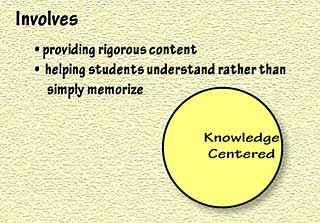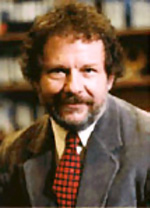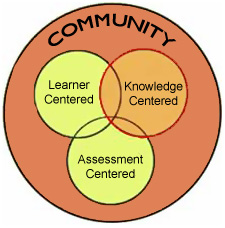How can faculty present important content to be learned in ways that improve student learning?
Page 3: Knowledge-Centered Learning Environments
 An instructor who wants to create a knowledge-centered learning environment throughout a course will need to answer three main questions about the course’s content:
An instructor who wants to create a knowledge-centered learning environment throughout a course will need to answer three main questions about the course’s content:
- What will be taught?
- How will it be taught?
- How will it be organized?
However, within these questions are a number of additional questions that an instructor should ask in order to accurately evaluate the knowledge-centeredness of the environment that needs to be created:
- Is the subject matter aligned with relevant standards?
- Is it organized around big ideas that matter to students?
- Is it focused on information and activities that help learners develop an understanding of a subject or discipline?
- Does it promote learning about available resources and how to use them?
- Does it produce knowledge and skills that are coherently organized and connected?
A knowledge-centered learning environment introduces knowledge (facts, ideas, concepts, and principles) in a timely manner—when the need to do so naturally arises, or when learners see a need. In this type of environment, learners should expect new information to make sense and should be prepared to ask questions when it does not. This emphasis on sense-making is crucial to helping students to develop metacognitive skills, those that help students learn more about their own learning. We’ll further discuss the importance of metacognitive skills in the section on assessment-centered learning environments. Listen to the audio clip to expand your understanding of knowledge-centered learning environments (time: 1:15).
Transcript: Kellie Reflects on Approaches to Instruction
As Kellie worked through this section of the module, she thought back to an undergraduate course that she loved. The professor was an excellent lecturer and a fascinating speaker. His talks were packed full of information. When she or her fellow students asked questions, he would always smile and give a brief answer. If the questioner still seemed uncertain in their understanding, he kindly suggested patience that it would all begin to make sense later and not to worry too much.
However, as a professor herself, Kellie was now beginning to understand that this professor had done a great job of deciding what would be taught and even how it would be organized but had only one approach to how it would be taught: lectures. And while she had received a good grade in the class herself, it was, she realized, because she was skilled at memorizing information. In fact, she remembered others who, despite their hard work, did not do well. The lecture-only approach did not provide those students with the opportunity to make real sense of what they were hearing or how it fit together. In that class, academic success was almost entirely based on a student’s ability to capture and memorize information and maybe not truly learn with understanding.
Ultimately, knowledge-centered learning environments guide students to learn with understanding, which in turn helps to build expertise and to facilitate the transfer of knowledge to other situations.
Although learning with understanding is the overarching goal, there are times when skill-building needs to be the primary goal. Thus, finding the balance between activities designed to promote understanding and those designed to develop skills that need to be automatic or second nature is a key challenge of building a knowledge-centered learning environment (Wiggins & McTighe, 1997).
Now that you’ve had a brief summary of a knowledge-centered learning environment, you might wish to take a few minutes to interact with the Challenge scenarios below.
Bass Fishing
The Bass Fishing movie (time: 0:38) and audio presentation by John Bransford (time: 1:41) below contrast learning a skill with understanding a discipline. It illustrates the reason learning with understanding is important for the student.
Transcript: Bass Fishing
Assume I want to teach you how to fish for bass. It’s simple really. I model for you what to do. I take you to a good spot on the lake. I help you pay attention to the lure that we’re using and the depth at which we’re fishing. I show you how to set the hook when a fish strikes and use the net to get fish into the boat. We catch our limits and we’re all happy. When you come to the lake the next time, you repeat the previous behaviors because you were reinforced for doing them. You were rewarded with catching fish. Here’s the challenge: What more is involved than modeling how to do things right and getting rewards for doing the right thing?
Transcript: John Bransford, PhD
Now, a lot of people find this to be an interesting challenge and some of them say, “Well, one thing we need in addition to just modeling is the motivation to learn.” And of course if you’re going fishing then you’re probably motivated, but in other cases you might not be. But I think what’s really important here is that this particular analysis showed us procedures of fishing for bass, but they really didn’t help us learn with understanding. Because an expert who’s actually doing this kind of thing has all kinds of things going on beneath the surface that he or she understands. For example, the last thing you might want to do, if you come back to this lake, say a month later, is do exactly what you did before. That’s not necessarily the best thing to do. You know where you go depends on the time of year, depends on the weather conditions, depends on the time of day, depends on the temperature of the water. The exact lure you use is going to vary depending on all those things. The more you know about the habits of fish and what they do and how they live, the better off you’re going to be. So this is a good example of the difference between just kind of learning procedurally (Okay, someone shows me how to do x, and then I repeat that behavior the next time) versus learning with understanding (so that I’m much more flexible and later I may do something very different than just fish exactly the way I did before). So this gives us a little bit of an introduction to the value of learning with understanding. And again, as I just mentioned, there’s a difference between just learning sets of procedures versus learning with understanding. And the payoff for learning with understanding is more flexible adaptation and transfer later on.
Wisdom
Click on the movie below (time: 0:58), and then listen to the audio for an introduction by John Bransford (time: 1:51) about the concept of conditionalized knowledge and the importance of understanding the conditions under which a fact may or may not be true.
Transcript: Pearls of Wisdom
Much of the wisdom of cultures is captured in the form of stories, proverbs, and witticisms. The following statements are all probably familiar to you:
Too many cooks spoil the broth.
Haste makes waste.
A penny saved is a penny earned.
A bird in the hand is worth two in the bush.
Many hands make light work.
He who hesitates is lost.
John Bransford: Think back to what we just heard about little pearls of wisdom, and one thing we heard was “Too many cooks spoil the broth.” And everybody can go, “Oh, yeah…true.” But we also heard “Many hands make light work.” And if you really think about it, these two things contradict one another. Similarly, we heard “Haste makes waste,” and we heard “He who hesitates is lost.” And again, they contradict one another. So what’s going on? How could this be wisdom if we have a bunch of contradictory facts?
Transcript: John Bransford, PhD
This challenge illustrates an aspect of what it means to know, effectively, that’s subtle and often missed, and it illustrates a point that I’ll call “conditionalized knowledge”: That to really be an expert, you can’t just know facts; you’ve got to know the conditions under which those facts are true. What learning scientists have begun to discover is each of these contradictory facts is true under certain conditionalized aspects of use. So when do too many cooks spoil the broth? Well, if we’re all trying to do one thing, we’re trying to make the soup and everybody does a little bit of something, it could really be a mess. But there’s other tasks where many hands really do make light work. Maybe we’re all working on somebody’s yard, and I can modularize the tasks so that you do the hedge and that doesn’t interfere with me doing the grass and that doesn’t interfere with someone else weeding the garden and so forth. So if things are modular and independent and don’t interfere with one another, then you have a very different state of affairs. So one of the really tricky things about developing expertise is learning about the conditions under which something is applicable this conditionalized knowledge. And experts are so good at this. Novices tend to have a hard time. So if you are learning statistics, for example, and you can learn about Z-tests and F-tests and parametrics and nonparametrics, you can memorize all the formulas, but what really counts is under what set of data and for what purposes and at what conditions should I use each kind of test? Or, if I’m a teacher teaching reading and I know a hundred reading strategies, the trick’s to know when do I use it depending on what my student needs to know? So conditionalized knowledge is one of the hallmarks of expertise and one of the hardest things to get people to develop.
Knowledge-Centered Example
To see how knowledge-centeredness is incorporated in an IRIS Module visit Accessing the General Education Curriculum: Inclusion Considerations for Students with Disabilities. Note that factual information for students is organized and presented in different formats (e.g., both text and audio interviews) and the material is aligned to the objectives of the module. Examples are used to help students transfer the content to real-life settings, allowing for better understanding and applicability of the material. Information is also presented in formats that facilitate better student understanding (e.g., color-differentiated tables with graphic cues that can increase retention).


